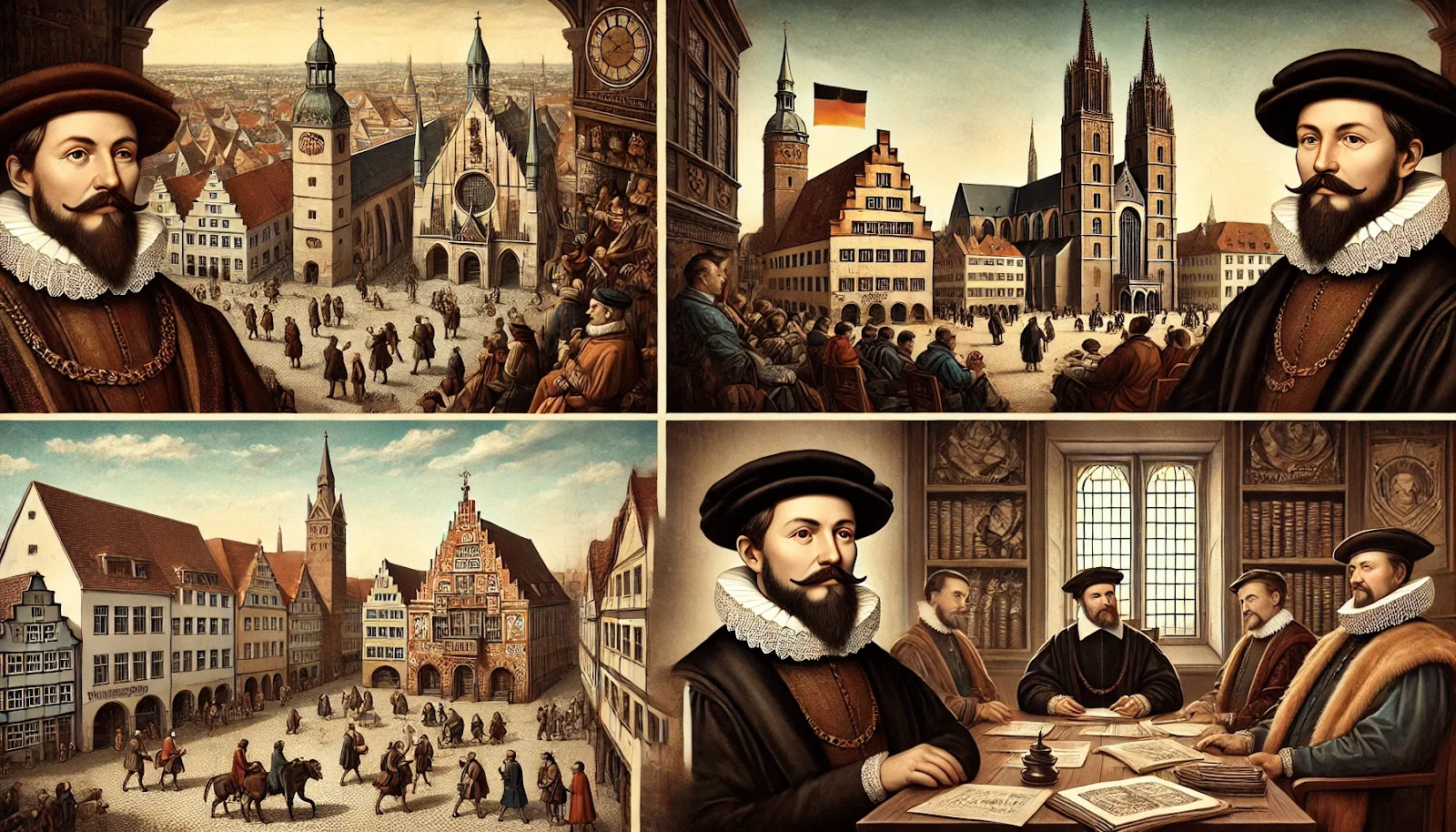The name Heinrich Servais may not ring as loudly as Martin Luther or other towering figures of the Protestant Reformation, but his contribution to the religious and political transformation in 1555 Germany was undeniably important. Servais, a prominent local figure during the time of the Peace of Augsburg, played a crucial role in navigating the volatile landscape of religious wars and political alliances. This article will explore Heinrich Servais’ life, his role in shaping religious thought, and the legacy he left behind.
Germany in 1555: A Nation in Turmoil
To understand Heinrich Servais, it is necessary to first look at the broader context of Germany in 1555. The country was in the grip of the Protestant Reformation, a movement initiated by Martin Luther that rapidly gained momentum and divided Europe. Religious wars, shifting alliances, and political intrigue defined this period. The Peace of Augsburg, signed in 1555, sought to bring an end to the religious conflict by allowing rulers to determine the official religion of their territories, whether Catholicism or Lutheranism.
This was a time when individuals like heinrich servais 1555 germany emerged as influential voices in their regions. The signing of the Peace of Augsburg, however, was not the resolution many hoped for; rather, it was a temporary measure that left many tensions unresolved. Servais, active during this critical time, navigated these tensions, advocating for religious and political changes while maintaining a delicate balance between conflicting forces.
Who Was Heinrich Servais?
Heinrich Servais, born into a prominent family in the Holy Roman Empire, likely hailed from a region in modern-day Germany or the Low Countries. His early life remains somewhat obscure, but it is known that by 1555, Servais had become a well-known figure in his local region, largely due to his involvement in religious debates and political diplomacy.
Unlike many of his contemporaries, who either fully embraced Catholicism or Protestantism, Servais occupied a middle ground. He was a skilled diplomat, working to mediate conflicts between warring Catholic and Protestant factions. His ability to bridge religious divides earned him respect and, at times, enmity from both sides.
Servais’ Role in 1555 Germany
In 1555, the landscape of Germany was divided not only along religious lines but also politically fragmented, with numerous principalities vying for power. Servais’ influence can be seen in the way he navigated these treacherous waters. He worked closely with Protestant leaders, particularly those aligned with the ideas of Martin Luther, while also seeking to maintain peace with Catholic rulers.
His most notable contribution during this time was his role in advocating for religious tolerance and political cooperation. Although Servais was not a signatory of the Peace of Augsburg, his efforts helped lay the groundwork for this treaty by promoting dialogue between religious factions.
The Protestant Reformation and Heinrich Servais
He supported the spread of Lutheranism in his region and worked to protect Protestant communities from Catholic retaliation.
Servais’ theological views were somewhat unorthodox. He is known to have questioned the supremacy of the Pope and the rigid hierarchy of the Catholic Church, aligning himself more closely with the egalitarian principles of the Reformation. His moderate stance, however, also made him a target of suspicion among more radical reformers, who saw his willingness to negotiate with Catholics as a betrayal of Protestant ideals.
The Peace of Augsburg and Servais’ Influence
The Peace of Augsburg was a pivotal moment in the history of Germany. This treaty, signed between the Holy Roman Emperor Charles V and the Schmalkaldic League, marked the official recognition of Lutheranism as a legitimate faith within the empire. It allowed princes to determine the religion of their own territories, effectively decentralizing religious authority in the region.
Heinrich Servais’ role in the years leading up to the Peace of Augsburg cannot be understated. He was instrumental in brokering local agreements between Catholic and Protestant rulers, laying the groundwork for broader negotiations. His ability to mediate between these conflicting groups was crucial in the eventual success of the treaty, which sought to maintain a fragile peace in a divided empire.
Heinrich Servais’ Relationship with Martin Luther
Though Heinrich Servais was not a direct disciple of Martin Luther, their paths inevitably crossed due to their shared commitment to religious reform. Servais, while not a theologian, supported many of Luther’s ideas, particularly the concept of “sola scriptura” (scripture alone) as the basis of faith. He also admired Luther’s courage in standing up to the Catholic Church, a stance that resonated with Servais’ own experiences in his region.
The two men, however, had differing approaches to reform. While Luther was a firebrand who sought sweeping changes, Servais preferred a more diplomatic approach. He believed in gradual reform and worked tirelessly to ensure that Protestantism could coexist alongside Catholicism without descending into open conflict. Despite their differences, Luther and Servais shared a mutual respect for one another’s efforts in advancing the Reformation.
Legacy of Heinrich Servais
Heinrich Servais may not be a household name today, but his influence on the political and religious landscape of 16th-century Germany was significant. His legacy lies in his ability to navigate the complex and often dangerous waters of religious reform and political diplomacy. By advocating for tolerance and dialogue, Servais helped pave the way for the eventual acceptance of Protestantism in Germany.
However, historians recognize that individuals like Servais played a crucial role in ensuring that the Reformation did not devolve into endless conflict. His legacy is one of moderation, diplomacy, and a commitment to peace in a time of great upheaval.
Conclusion
Heinrich Servais’ contributions to the religious and political landscape of 1555 Germany are a testament to the power of diplomacy and moderation. In an era marked by religious wars and political upheaval, Servais stood out as a voice of reason, advocating for tolerance and dialogue between Catholics and Protestants. His influence, though often overshadowed by more famous figures of the Reformation, played a crucial role in shaping the future of Germany and ensuring that the Peace of Augsburg could take hold.
Frequently Asked Questions
What was Heinrich Servais’ role in the Peace of Augsburg?
While Heinrich Servais was not a signatory of the Peace of Augsburg, his diplomatic efforts in brokering local agreements between Catholic and Protestant factions helped lay the groundwork for this historic treaty.
How did Heinrich Servais’ views differ from Martin Luther’s?
Although Servais supported many of Martin Luther’s ideas, particularly regarding the authority of scripture, he favored a more diplomatic and gradual approach to religious reform, which contrasted with Luther’s more radical stance.
Did Heinrich Servais face opposition from both Catholics and Protestants?
Yes, Servais’ moderate stance made him a target of suspicion from both sides. Radical Protestants saw his willingness to negotiate with Catholics as a betrayal, while Catholics viewed him as a dangerous reformer.
What was Heinrich Servais’ family background?
Servais came from a prominent family in the Holy Roman Empire, although little is known about his early life. His family’s status likely provided him with the education and connections necessary for his later diplomatic career.
What impact did Heinrich Servais have on the spread of Lutheranism?
Servais played a key role in protecting Protestant communities and advocating for the spread of Lutheran ideas in his region. His diplomatic efforts helped ensure that Lutheranism could take root without provoking open conflict.
Why is Heinrich Servais important today?
Heinrich Servais’ legacy of moderation and diplomacy serves as a reminder of the importance of dialogue and tolerance in times of conflict. His efforts to bridge religious divides remain relevant in modern discussions about religious and political coexistence.











